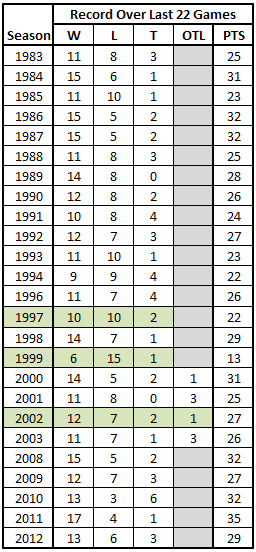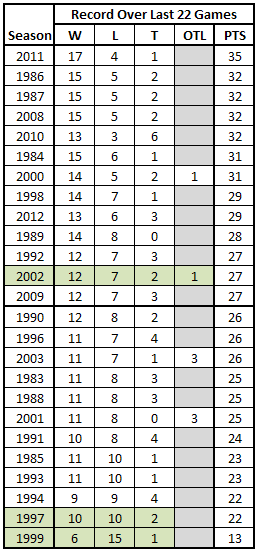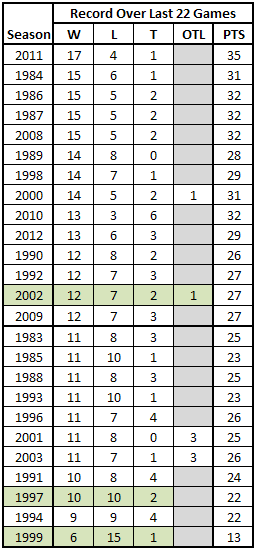When the Washington Capitals skate off the ice tonight against the Florida Panthers, they will hit the 60-game mark of their season. Multiples of ten have a certain charm as mileposts for analysis (we’ve certainly abused the concept over the years in our scribbles), but what might interest us more at this point is those last 22 games.
If the Caps need 92 points to make the playoffs and go into their last 22 games needing 27 points to get there (assuming they beat Florida tonight), does their history suggest a likelihood of reaching that mark in their last 22 games?
Let us start with an arbitrary standard – 30 wins. We will look at those Capitals teams that reached the 30-win mark in a full season (1995 and 2013 being abbreviated seasons and not part of this discussion). Why not playoff teams, Peerless? To cast a wider net. A 30-win team can be said (arbitrarily) to be a pretty good team that had at least a glimmer of playoff hope. In fact, of the 25 teams in Caps history to win 30 or more games in a season, 22 made good on that hope. But three did not, as well (1997, 1999, and 2002).
With that population of 30-win teams identified, we can reduce this to an elemental level. Based on history, do the Caps have a reasonable likelihood of earning 27 more points in their last 22 games. Putting it more prosaically, do the Caps have a history of having a strong finishing kick? Here are the 30-win seasons and the Caps’ final 22-game record (non-playoff years shaded):
The Caps have a bit of a range of wins and standings points over these seasons, closing with between 6 and 17 wins over their last 22 games and between 13 and 35 standings points. But within those ranges, do the Caps trend to the upper or the lower bound over the years. Let us reorder the table, first by standings points (since that will be the basis for playoff eligibility):
Thirteen of the 25 Capitals teams to reach 30 wins did record at least 27 standings points over their last 22 games (remember, assuming the Caps win tonight, 27 points is the basis for getting to the theoretical playoff threshold of 92 points), slightly better than half of the teams. The trouble with standings points on their own is that the NHL has tweaked the formulas for wins, losses, and what happens in extra time over the years, so it is not as clean as one might like.
So, let us do this another way. How many wins do the Caps need to get to the theoretical 92-point playoff floor? We can reorder the table again:
It looks a lot like the table ranked by standings points. If you compare them, a number should be leaving an impression: 12. Based on the Caps’ history, they are going to need 12 wins in their last 22 games to get to 92 points. Of course, if that means 12-10-0 (24 points), they will not reach 92 points, and if they go 12-0-10 (34 points), they will be safely in. But no team ever seems to have records devoid of either regulation or extra time losses in this span of games.
Using history has its charms, but it has its pitfalls, too. The 1983 team had Bobby Carpenter, Bengt Gustafsson, and Doug Jarvis. The 2013 team had Alex Ovechkin, Nicklas Backstrom, and Joel Ward. The point is that every team is a snowflake; no two are entirely alike or even remotely alike with the long passage of time.
However, while teams are not alike in composition, they can be alike in a shared level of performance. And so it seems to be with the Caps, who performed within a range of 11-13 wins for 13 of the 25 seasons examined here and within a range of 25 to 29 standings points for 12 of the 25 seasons.
There is another point to be made here. You would think that the 2009-2010 team, one that compiled 121 standings points for the season, would be the best finisher of this group. It was not. That team ranked only in a tie for second in standings points over its last 22 games and only tied for ninth in wins. Juxtapose that with a team we left out – last year’s. The 2012-2013 team finished their campaign 16-4-2 in the last 22 games of the abbreviated 48-game season to reach the playoffs. The point is that you do not have to be the best team to be the best finisher, just find a way to do it.
Scheduling is, of course, the uncontrolled variable here. For the Caps, the schedule in March is challenging, to say the least. But the Caps do have a reasonably consistent history of realizing the sort of finishing kick they will need to make the playoffs. That same history suggests it is going to be a nail-biter getting there.



